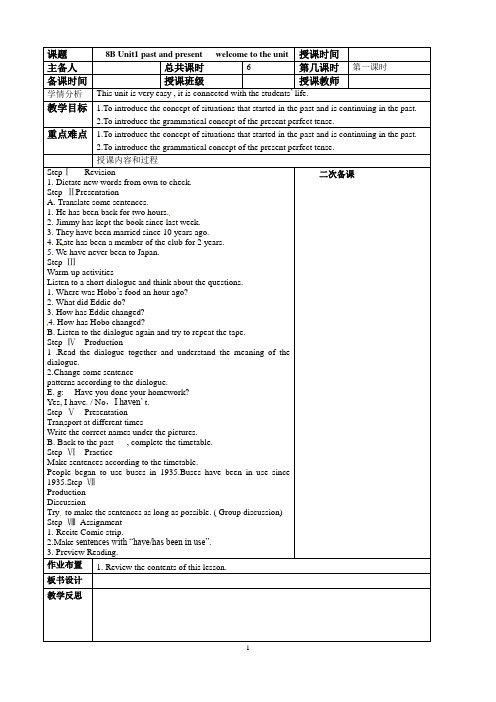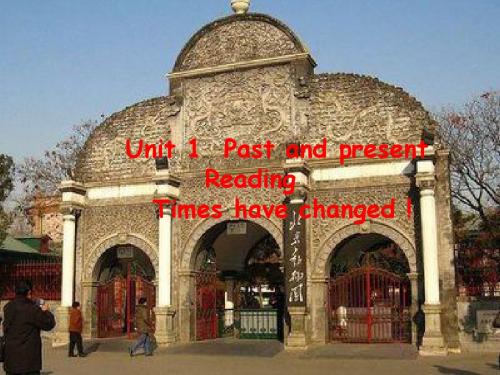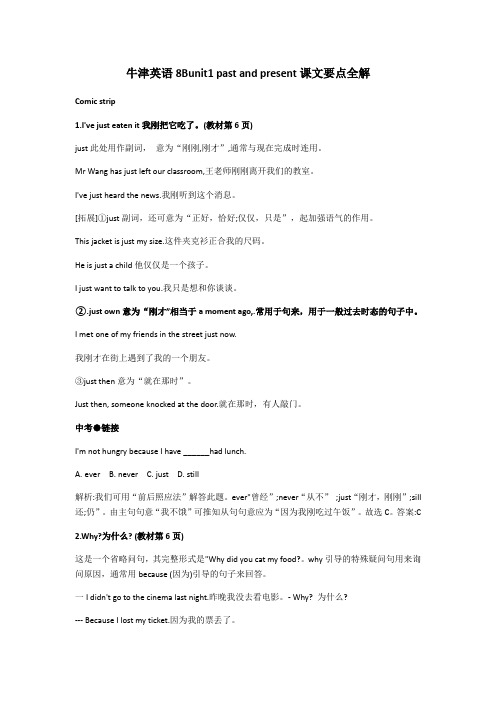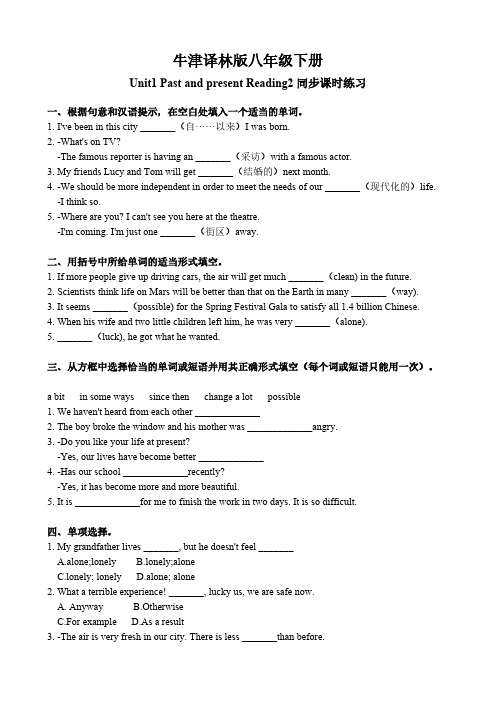牛津译林版八年级下册Unit1Past and present Reading课件
江苏新教材牛津英语八年级下Unit1 Past and present Reading 2

尔”,相当于sometimes或at times,可
用于句首或句尾。
From time to time he could get some
information about her.
他偶尔能得到一些有关她的消息。 She has to work at weekends from time to time. 她偶尔周末还得工作。
学习句子: Do you know Sunshine Town very well, Mr Chen? Now I feel a bit lonely from time to time.
2. 技能目标: 1)了解阳光镇的变化情况。 2) 对比阳光镇现在与过去的不同之处,并进 行描述。 3) 了解采访的方式和方法,以及谈论城市变 迁时可用的各种表达。 4)进一步认识现在完成时。 3. 情感目标:学会描述家乡之美, 提高自己的道
学习词组: in the northern part of, get married, since then, change a lot, over the years, in the town center/ in the center of town, turn … into …, put … into…, realize the problem, take action to do sth, improve the situation, in some ways, move away, as often as before, feel lonely, a bit, from time to time/at times/ sometimes
2) 在否定句中,二者意义则恰恰相反。 not a bit意为“一点儿也不”,相当于 not at all,而not a little意为“很多,不
牛津译林版英语8B八年级下册_Unit1_表格式教案

课题8B Unit1 past and present welcome to the unit 授课时间主备人总共课时 6 第几课时第一课时备课时间授课班级授课教师学情分析This unit is very easy , it is connected with the students’ life.教学目标 1.To introduce the concept of situations that started in the past and is continuing in the past.2.To introduce the grammatical concept of the present perfect tense.重点难点 1.To introduce the concept of situations that started in the past and is continuing in the past.2.To introduce the grammatical concept of the present perfect tense.授课内容和过程StepⅠRevision二次备课1. Dictate new words from own to check.Step ⅡPresentationA. Translate some sentences.1. He has been back for two hours.2. Jimmy has kept the book since last week.3. They have been married since 10 years ago.4. K ate has been a member of the club for 2 years.5. We have never been to Japan.Step ⅢWarm-up activitiesListen to a short dialogue and think about the questions.1. Where was Hobo’s food an hour ago?2. What did Eddie do?3. How has Eddie changed?4. How has Hobo changed?B. Listen to the dialogue again and try to repeat the tape.Step ⅣProduction1 .Read the dialogue together and understand the meaning of thedialogue.2.Change some sentencepatterns according to the dialogue.E. g: ---Have you done your homework?Yes, I have. / No,I haven’ t.Step ⅤPresentationTransport at different timesWrite the correct names under the pictures.B. Back to the past , complete the timetable.Step ⅥPracticeMake sentences according to the timetable.People began to use buses in 1935.Buses have been in use since1935.Step ⅦProductionDiscussionTry to make the sentences as long as possible. ( Group discussion)Step ⅧAssignment1. Recite Comic strip.2.Make sentences with “have/has been in use”.3. Preview Reading.作业布置 1. Review the contents of this lesson.板书设计教学反思课题8B Unit1 past and present Reading 1授课时间主备人总共课时 6 第几课时第二课时备课时间授课班级授课教师学情分析这一课时非常贴近学生的生活,很容易引起学生共鸣。
牛津译林版八年级下册Unit 1 Past and Present课件1

Picture show
Let’s enjoy pictures of Beijing first. Witness great changes of Beijing!
market stall
Exercises
事实上
结婚 搬出 变了许多 中国象棋 市场售货摊 在过去
翻译下列短语
in fact get married move out of change a lot Chinese chess market stall in the past
Exercises
变成
翻译下列短语
turn into play cards Reduce pollution Chinese medicine shop from time to time
4. Nanjing has _________ changed a lot since 2000.
5. My cousin is no longer a student. He has __________ become an office worker now.
Thank you!
Deep reading
Read the dialogue again and answer the following questions about Sunshine Town
1.What’s the reason of the pollution?
2.Does Mr. Dong feel a bit lonely? Why? 1.There were once a steel factory near the Sunshine River. 2.Yes. Because his old friends have moved away.
牛津译林版八年级英语下册Unit1知识点归纳总结

1. past and present 过去和现在past 1). n. in the past(一般过去时)2). adj. in the past few years(现在完成时) 3). prep. walk past 经过=present 1). n. 现在, 目前 at present 2). n. 礼物 receive a present 收到一件礼物 2. in the bowl 在碗里; on the plate 在盘子上 3. 1).过去常常做某事(现在不做了) usedto do sth. = often did sth. in the pastused to be…= … was/were once… = was/were… in the past 和某人分享某物 share sth. with sb.Eg. You often shared food with me in the past. = Youfood with me.You used to be so kind to me. = Youto me.2). 习惯于, 适应于(做)某事 be/get used to (doing) sth. (现在仍如此做)我习惯于上午六点起床。
Iup at 6 a.m.3). 区分:used to do sth. 过去常常做某事(现在不做)get/be used to doing sth. 习惯于做某事(to 为介词)4. just 1). adv. 刚才(现在完成时) I’v e just eaten it.2). adv. 正好, 恰好(加强语气) The shirt is just my size.这件衬衫正和我的尺码。
3). just now 刚刚, 刚才(一般过去时);5. change 1). v./n. 改变, 变化 changes in/to … ……的变化 T h etown has changed a lot over the years.(v.)= There have been great changes over the years. (n.)= Great changes have taken place over the years.2). n. [U] 零钱. Here is your change. 这是你的零钱。
牛津译林版八年级英语下册8Bunit1 past and present 课文要点全解

牛津英语8Bunit1 past and present课文要点全解Comic strip1.I've just eaten it我刚把它吃了。
(教材第6页)just此处用作副词,意为“刚刚,刚才”,通常与现在完成时连用。
Mr Wang has just left our classroom,王老师刚刚离开我们的教室。
I've just heard the news.我刚听到这个消息。
[拓展]①just副词,还可意为“正好,恰好;仅仅,只是”,起加强语气的作用。
This jacket is just my size.这件夹克衫正合我的尺码。
He is just a child他仅仅是一个孩子。
I just want to talk to you.我只是想和你谈谈。
②.just own意为“刚才”相当于a moment ago,.常用于句来,用于一般过去时态的句子中。
I met one of my friends in the street just now.我刚才在街上遇到了我的一个朋友。
③just then意为“就在那时”。
Just then, someone knocked at the door.就在那时,有人敲门。
中考●链接I'm not hungry because I have ______had lunch.A.everB. neverC. justD. still解析:我们可用“前后照应法”解答此题。
ever"曾经”;never“从不”;just“刚才,刚刚”;sill 还;仍”。
由主句句意“我不饿”可推知从句句意应为“因为我刚吃过午饭”。
故选C。
答案:C2.Why?为什么? (教材第6页)这是一个省略问句,其完整形式是"Why did you cat my food?。
why引导的特殊疑问句用来询问原因,通常用because (因为)引导的句子来回答。
牛津译林版英语八下Unit 1《Past and Present》(Task)教学设计

牛津译林版英语八下Unit 1《Past and Present》(Task)教学设计一. 教材分析牛津译林版英语八下Unit 1《Past and Present》主要介绍了人们的生活在过去和现在是如何变化的。
通过对比过去和现在的生活,让学生学会使用过去时和现在时描述事物的变化。
本课时的Task部分主要让学生学会如何根据自己的需求选择合适的住房。
本节课的主要话题是房屋租赁和购买,学生需要掌握相关的词汇和句型,以及学会如何进行房屋租赁和购买的对话。
二. 学情分析学生在学习本节课之前,已经掌握了如何描述过去和现在的生活的语法知识,同时也具备了一定的房屋租赁和购买的相关词汇。
但是,学生对于如何在实际场景中运用这些知识和词汇进行对话还存在一定的困难。
因此,在教学过程中,教师需要帮助学生将这些知识和词汇应用到实际场景中,提高学生的实际语言运用能力。
三. 教学目标1.知识目标:–学生能够掌握并运用相关的词汇和句型描述房屋租赁和购买的情况。
–学生能够通过对比过去和现在的生活,学会使用过去时和现在时描述事物的变化。
2.能力目标:–学生能够在实际场景中运用所学的知识和词汇进行对话。
–学生能够提高自己的听、说、读、写的能力。
3.情感目标:–学生能够通过学习本节课,增强对英语学习的兴趣。
–学生能够学会如何根据自己的需求选择合适的住房。
四. 教学重难点•学生能够掌握并运用相关的词汇和句型描述房屋租赁和购买的情况。
•学生能够通过对比过去和现在的生活,学会使用过去时和现在时描述事物的变化。
•学生能够在实际场景中运用所学的知识和词汇进行对话。
•学生能够学会如何根据自己的需求选择合适的住房。
五. 教学方法1.情境教学法:通过设定真实的房屋租赁和购买的场景,让学生在实际情境中学习并运用所学的知识和词汇。
2.任务型教学法:通过完成具体的任务,让学生学会如何根据自己的需求选择合适的住房。
3.交际法:通过小组讨论和角色扮演等方式,让学生在课堂上进行真实的交际,提高学生的听、说、读、写的能力。
八年级英语(牛津译林版)下册:Unit1PastandpresentReading2

Rosegotmarriedtoateacher.罗斯和一位教师结婚了。
1.她嫁给了一个商人。 She__m_a_r_ri_e_d_abusinessman. 2.他们什么时候结婚的? Whendidthey__g_e_tm__ar_r_ie_d___? 3.她5年前嫁给她丈夫。 She_go_t_m_a_r_r_ie_d_t_o/_m__ar_r_ie_d____herhus
(1)Iwas___a_lo_n_e__,butIdidn‘tfeel__ ______lo_n_e.ly (2)Ifelt_l_on_e_laytthe___lo_n_evlyillage. (3)Thechildrenstaysathome______ ___a_lo. ne (4)Iwas____a_lo_n_e,butnot____lo_n_el.y
MrChen
HowlonghehaslivedinSu
nshineTown
Sincehewasborn.
Wherehefirstlived
Inthenorthernpartoftown.
Whenhegotmarried
In1965
Wherehelives
Aflattwoblocksaway
Revision: Fillintheblanks:
空白演示
在此输入您的封面副标题
Beijinghasc hangedalot!
Wangfujingstreet
marketstalls inthepast
shoppingmalls atpresent
牛津译林版八年级下册Unit1 Past and present Reading2同步练习(有答案)

牛津译林版八年级下册Unit1 Past and present Reading2同步课时练习一、根据句意和汉语提示,在空白处填入一个适当的单词。
1. I've been in this city _______(自······以来)I was born.2. -What's on TV?-The famous reporter is having an _______(采访)with a famous actor.3. My friends Lucy and Tom will get _______(结婚的)next month.4. -We should be more independent in order to meet the needs of our _______(现代化的)life. -I think so.5. -Where are you? I can't see you here at the theatre.-I'm coming. I'm just one _______(街区)away.二、用括号中所给单词的适当形式填空。
1. If more people give up driving cars, the air will get much _______(clean) in the future.2. Scientists think life on Mars will be better than that on the Earth in many _______(way).3. It seems _______(possible) for the Spring Festival Gala to satisfy all 1.4 billion Chinese.4. When his wife and two little children left him, he was very _______(alone).5. _______(luck), he got what he wanted.三、从方框中选择恰当的单词或短语并用其正确形式填空(每个词或短语只能用一次)。
- 1、下载文档前请自行甄别文档内容的完整性,平台不提供额外的编辑、内容补充、找答案等附加服务。
- 2、"仅部分预览"的文档,不可在线预览部分如存在完整性等问题,可反馈申请退款(可完整预览的文档不适用该条件!)。
- 3、如文档侵犯您的权益,请联系客服反馈,我们会尽快为您处理(人工客服工作时间:9:00-18:30)。
Fill in the form.
The changes in In the past Sunshine Town What we had / Some small restaurants __________, post office have in the shops, a ___________ cinema town and a _________. Water pollution A steel factory near the Sunshine River often put waste into the river. the ______ play Old friends often ______ Feeling cards and Chinese chess together ________. At present
Mr Chen: Yes! We only had some small restaurants and shops years age. And we had a post office and a cinema in the town centre. Now the government has turned part of the town centre into a new park. We have a new
often put the waste into the river. Later
the govern realized the problem and
took action to improve the situation.
Now the river is much cleaner.
Millie: Do you think life is better now? Mr Chen: Well, in some ways it is. It's really
park a new A new ______, theatre ________ and a large shopping mall ______________.
A Times have changed
Millie wants to write about the changes in Sunshine Town for her history project. Daniel’s grandpa, Mr Chen, knows a lot about Sunshine Town, so Millie is interviewing him to get some information.
8B Unit 1 Past here is your hometown?
How long have you lived there?
What has changed in your hometown?
Important words: since, ever, northern, married, wife, block, since, over, pollution, factory, waste, realize, situation, however, impossible, before, lonely, anyway Important phrases: get married, turn … into …, take action to, in some ways, from time to time
theatre and a large shopping more too.
Millie:
Was pollution a problem then?
Mr Chen: Yes, it was. There was once a steel
factory near the Sunshine River. They
nice to have a beautiful modern town.
However, most of my old friends have moved away. It has become impossible for us to see each other as often as before. We used to play cards and Chinese chess together. Now I feel a bit lonely from time to time. Anyway, it's good to see the amazing changes in the town.
Millie:
Do you know Sunshine Town very well, Mr Chen? Mr Chen: Sure. I’ve lived here since I was born. Millie: Have you ever moved house? Mr Chen: Yes. I first lived in the northern part of town with my parents. When I got married in 1965, my wife and I moved two blocks away and we’ve lived in this area since then. Millie: Has the town changed a lot over these years?
Listen to the interview and answer the following questions. 1. How long has Mr Chen lived in Sunshine Town? He has lived here since he was born.
2. Has the town changed a lot over the years.
